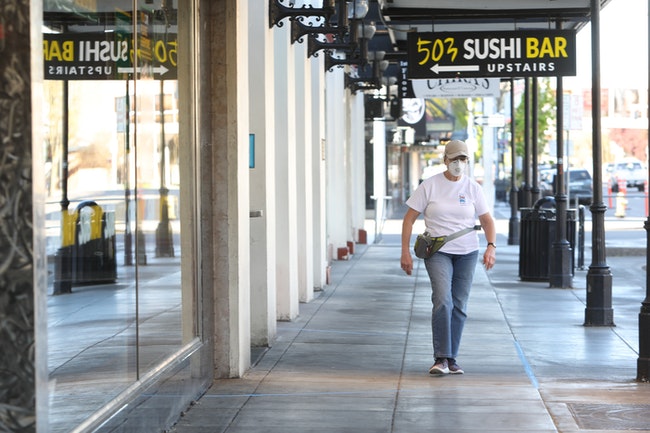 A woman wearing a mask walks along Liberty Street in downtown Salem on Thursday, April 16. (Amanda Loman/Salem Reporter)
A woman wearing a mask walks along Liberty Street in downtown Salem on Thursday, April 16. (Amanda Loman/Salem Reporter)
Complaints have flooded into Oregon’s worker safety agency ever since it was charged with enforcing many orders related to the Covid pandemic. Now, a database of state records suggests Salem’s employers aren’t enforcing a statewide mask mandate.
Over the last month, those complaints lodged with the Oregon Occupational Safety and Health Administration have largely concerned customers and employees not wearing masks in grocery stores, retailers, salons and other public places.
Dan Clay, president of United Food and Commercial Workers Local 555, the union representing retail and food service workers, said employees tasked with enforcing the mandate are facing volatile customers unwilling to put a mask on. He said his members are already at greater risk of being exposed to the virus, which he said is made worse by mask-less customers.
“It’s a worker safety issue,” he said. “Lives hang in the balance.”
Since Gov. Kate Brown enacted a face-covering requirement for Marion and Polk counties on June 24, there have been over 200 complaints filed with the agency concerning Salem restaurants, construction companies, grocery stores, salons and other employers. About 80% of the complaints concern employers not enforcing the requirement.
The requirement, which was expanded statewide on July 1, exempts people with medical conditions that make it hard to breathe while wearing a mask.
Public health officials have touted the widespread use of masks as a key way to slow the spread of the virus and allow schools and the economy to reopen.
Statewide, there have been over 3,700 complaints, the majority of which have also concerned people not wearing masks or facial coverings.
“We’re not going to physically pick someone up and throw them out the door,” said Dana Vugteveen, general manager of the Salem Center mall, which has been subject to a complaint regarding customers not wearing facial coverings.
Vugteveen said signs noting the requirement are posted at the entrance of the mall, located at 401 Center Street N.E., as well as in retailers in the shopping center.
He said the mall’s uniformed safety staff will approach mask-less customers and ask if they are aware of the mandate informing them that they can purchase one.
Most of the time it’s a polite conversation, he said. Staff will ask customers why they are not wearing a mask and will refer them to curbside pickup and online shopping options if they have a condition that makes breathing difficult, he said. Most of the time customers pull a mask out of their pocket and put it on, he said.
The mall will refuse entry to customers who flaunt the requirement, he said. But he said there are challenges.
“Because there are folks out there that think they don’t need to (wear masks),” he said.
Fred Meyer has been the target of about a dozen complaints nearly all involving employees or customers not wearing masks inside stores.
In a statement, the company said it required customers to wear masks starting on July 22. The company acknowledged that customers may not be able to wear masks because of medical reasons and have encouraged them to consider face shields or use deliver or pickup serves (which it has waived its $4.95 fee for).
As the requirement has gone into effect in Oregon and elsewhere, masks have become a culture war issue. Videos have surfaced online of confrontations involving employees at grocery stores and customers refusing to wear a mask.
Major employers have told his members that they should not interfere with customers’ ability to shop if they’re not wearing a mask, said Clay.
“They are really, really bothered,” he said. “They are wearing masks to protect the community and they feel like the community isn’t wearing masks to protect them.”
Clay said that his members have reported being assaulted while trying to enforce the mask requirement. He said that many members are working their first job bagging groceries or running a cash register and that businesses should bring in trained staff to deal with these potentially volatile encounters.
Typically, Oregon OSHA will reach out to the employer that’s subject to a complaint. If the employer responds promptly with evidence it’s making a serious effort to meet requirements, the complaint will be resolved with a letter.
In some cases, the state agency will follow up with spot checks. But since the pandemic orders went into effect, Oregon OSHA has issued just a handful of penalties.
Clay said that Oregon OSHA should more aggressively enforce the requirements.
Oregon OSHA Administrator Michael Wood said in an email that there has been a great deal of confusion related to the medical exemption for the mask requirement. But he said that businesses must accommodate people claiming these exemptions but “without simply allowing such individuals to enter without a face covering and without any additional restriction.”
He said that in most cases, Oregon OSHA is able to reach a resolution by clarifying the requirement without an enforcement visit.
“In others, businesses are choosing to disregard these expectations even when they have been made clear,” he said. “Those employers risk inspection and penalties — including substantial penalties — for failing to do their part to protect their workers in the midst of this pandemic.”
Wood said that while the agency may not inspect all employers who’ve drawn complaints. But he said the agency will increase inspections in the coming weeks issuing citations when appropriate.
SUPPORT ESSENTIAL REPORTING FOR SALEM – A subscription starts at $5 a month for around-the-clock access to stories and email alerts sent directly to you. Your support matters. Go HERE.
Contact reporter Jake Thomas at 503-575-1251 or [email protected] or @jakethomas2009.









